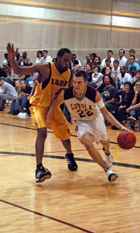A year after athletic scholarships were re-implemented at Loyola, one aspect remains unsettled: What’s next?
In November of last year, the Rev. Kevin Wildes, S.J., university president, announced that the athletic scholarship program will continue through the 2007-08 academic year for men and women’s basketball. The future recruits must have a 3.0 grade point average in high school and a 24 on the ACT.
“[Wildes] has continued it, but now we’re back facing the same thing again. He bought himself some time – that’s it,” said University Senate President Nancy Dupont.
Dupont, associate professor of communications, was involved last year in the highly debated issue of the University Senate’s exclusion from the decision to implement the scholarships.
“Once the decision was made, that was the end of it for the Senate. Wildes has not indicated his position [for the future]. It’s totally up to him,” Dupont said.
One question to be asked for the future is: Why just basketball?
The answer may be found within the pages of the original proposal that the ad hoc committee for athletic scholarships prepared for Wildes: “At Loyola University New Orleans, basketball has the ability to give back the most to the university community. The sport is played on campus in The Den and covers the fall and spring semesters. Basketball creates the most media exposure, and generates the most revenue through corporate sponsorships, gate receipts, concession sales and fund raising.”
In the proposal, the sports were ranked in a tier system to implement
the scholarships. The tier system took into consideration: 1) length of competitive season, 2) ability to create
revenue, 3) publicity production, 4) emphasis based on the sports offered by schools in the Gulf Coast Athletic Conference, 5) emphasis placed on
specific sports by the National Association of Intercollegiate Athletics and 6) tradition.
Tier one included men and women’s basketball. Tier two was baseball and volleyball, and tier three had women’s soccer and cross country.
Student Government Association President Martina Mills, communications senior and member of the ad hoc committee, said she believes that the scholarships should be implemented in fairness to all sports, and that it is not just the students who are uninformed.
“No one really knows what’s going on. It’s about researching to put the university in the right direction, so Wildes should take his time,” Mills said.
Mills added that the athletes will learn teamwork and leadership, which are positive qualities. She said continuing the athletic scholarships will improve school spirit and how Loyola works together.
“I do believe you can truly be educated outside the classroom,” Mills said, “but we have to make sure that whatever happens, we’re prioritizing academics.”
The Rev. William Byron, S.J., former interim president, told The Maroon last year that the athletic scholarships would “racially integrate the teams.” However, of the first six scholarship athletes, five of them are non-minorities.
In the University Senate minutes from the meeting held last October, Peter Burns, chairperson of the ad hoc committee established by Byron, addressed the issue of minority recruitment. Burns, associate professor of political science, said that we might not have been able to recruit minorities because: 1) they didn’t meet the academic requirements, 2) the timing of recruiting was so late that Loyola may have lost them to other schools or 3) they simply chose to go elsewhere.
Burns declined to comment on the issue further to The Maroon.
At a Town Hall meeting April 19, Wildes briefly discussed the future of the athletic scholarships.
“We need to look not just at athletic scholarships but the whole realm of athletics,” Wildes said.
He has acquired the help of two men to evaluate Loyola’s athletics: Denis Kanach, athletic director at Randolph-Macon University, and Francis X. Rienzo, athletic director of Georgetown University.
“[They] will look at the whole picture … what kinds of questions do we need to be asking? How do we allocate the use of our space?” Wildes said.
Wildes said Kanach and Rienzo have started with looking at the university’s mission statement and at how we can organize to make Loyola more competitive with other schools.
Said Wildes: “This will put me on a firmer and clearer ground to move forward with the scholarships.”
Meghan Petchel can be reached at [email protected].







